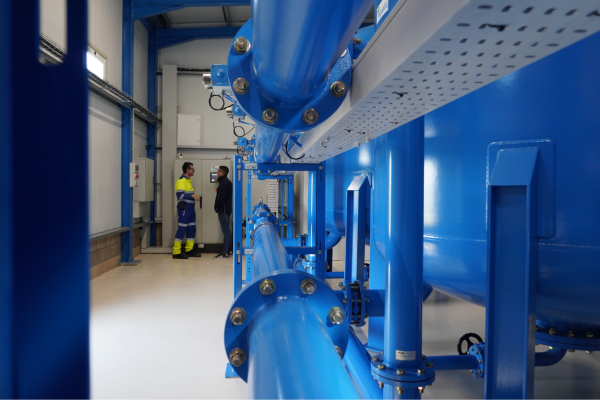
There is no magic in water management
- On the occasion of World Water Day, Aqualia highlights the value of supply and sanitation systems, which make it possible for water to flow when taps are turned on and for it to be returned to the environment in good condition after use.
- The company reminds us that the best way to protect water resources is to prevent its loss with the help of technology and a commitment to modernizing infrastructure.

For more than three decades, the United Nations has celebrated World Water Day on March 22 to remind us of the importance of this vital resource and to raise awareness about the 2.2 billion people who live without access to safely managed drinking water, advocating for action to address the global water crisis.
In Spain, almost the entire population has access to drinking water and sanitation, thanks to an extensive supply network of 460,000 km, long enough to circle the Earth at the equator nearly 12 times. Additionally, the water sector in Spain includes companies considered among the world leaders, technologically advanced, providing efficient and responsible solutions in the management of this resource; with professionals working 24 hours a day, 365 days a year to ensure the service does not fail.
In commemoration of this day, Aqualia values the management of the integral water cycle and its professionals, a job that is often hidden but enables the development of life in any locality.
Much more than you see
"People only think about water when it is lacking, but the best indicator that we are doing our job well is that no one talks about us" say Aqualia representatives. Supply and sanitation networks constitute vital infrastructure, enabling water to flow when taps are turned on and for it to be returned to the environment in good condition after use.
Water reaches cities and towns after traveling many kilometers, coming from nearby springs, reservoirs, and dams. However, a large percentage of these networks have been in operation for more than 40 years, increasing the likelihood of incidents in the pipes. One of the most common issues is leaks, a serious problem worldwide, including in Spain.
The concept of Non-Revenue Water (NRW) encompasses water lost due to leaks, breaks, meter reading failures, fraud, and unauthorized consumption. NRW is an enemy that Aqualia fights every day.
Leaks are combated as a team: on one hand, through a digitized system, and on the other, on the ground. The work starts from Aqualia's remote control posts, where managers and technicians ensure that the entire system of a municipality operates correctly. Here, through their screens, they monitor what happens in the kilometers of pipes hidden underground, which are monitored thanks to control sectors. The devices monitoring these sectors are anchored to the locality's pipes and provide continuous information on flow and pressures.
At the control posts, people daily check that the emitted data is within normal ranges or if there is any deviation, signaling an anomaly in the pipes. This series of technologies indicates the area where a water leak is occurring, narrowing it down to two or three streets, and then the "leak hunter" operator locates the exact point through the vibrations produced by the water loss in the subsoil. Traditionally, these specialists operated at night, when there is less noise on the streets and water consumption is minimal, equipped with instruments to track the streets by capturing the sound of the subsoil with an amplifier. Gradually, new remote leak detection systems in the water network using sensors are being implemented, reducing the time from detecting a leak to locating it. Water loss control is increasingly enhanced thanks to technology.
However, maintaining an increasingly aging infrastructure remains essential. The Spanish Association of Water Supply and Sanitation (AEAS in Spanish) estimates an annual investment of 350 million euros is needed to address real water losses in Spain's supply networks. In its latest report, it states that the renewal rate of these networks reaches only 0.2%, "well below the ideal 2% for maintaining infrastructure in sustainable conditions." The latest report from SEOPAN (Association of Construction and Infrastructure Concession Companies of Spain) reflects that Spain is the European country investing the least in the network during the period 2014-2027 (0.14% compared to a European average of 0.32%).
Aqualia, with its 2024-2026 Strategic Sustainability Plan as a guide, has developed plans to reduce non-revenue water volumes and improve the efficiency of water networks in the municipalities it serves. One of its commitments is digitalization. In addition to increasingly implementing technology and digitalization in its systems, it currently has 558 services using its own mobility applications (GEO and NOW) to optimize its work operations; and already has 71 services in Spain working with big data and Artificial Intelligence, double the number in 2022.




